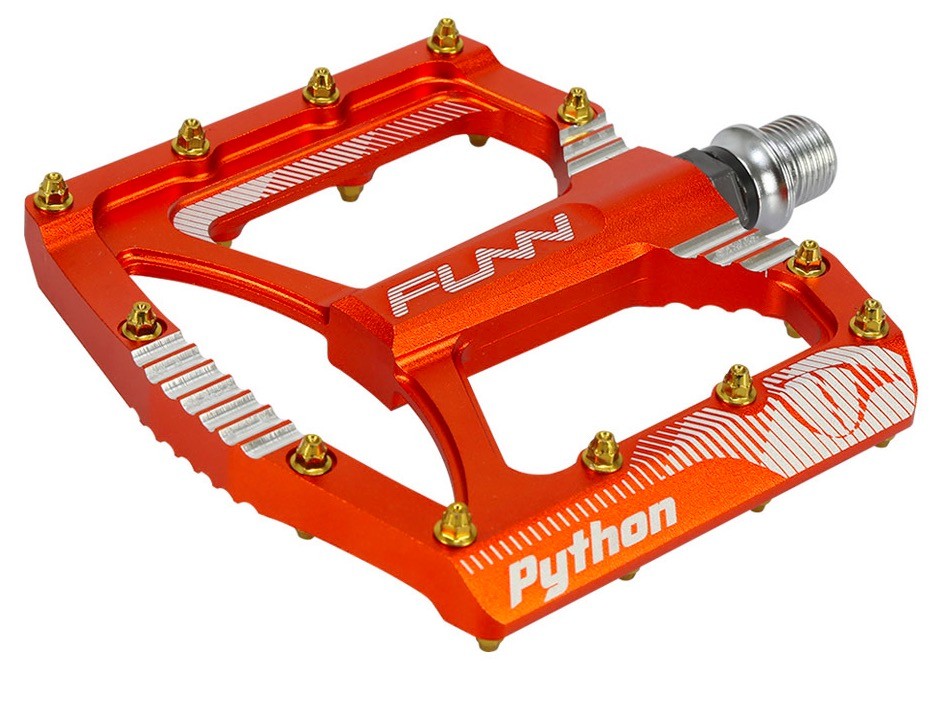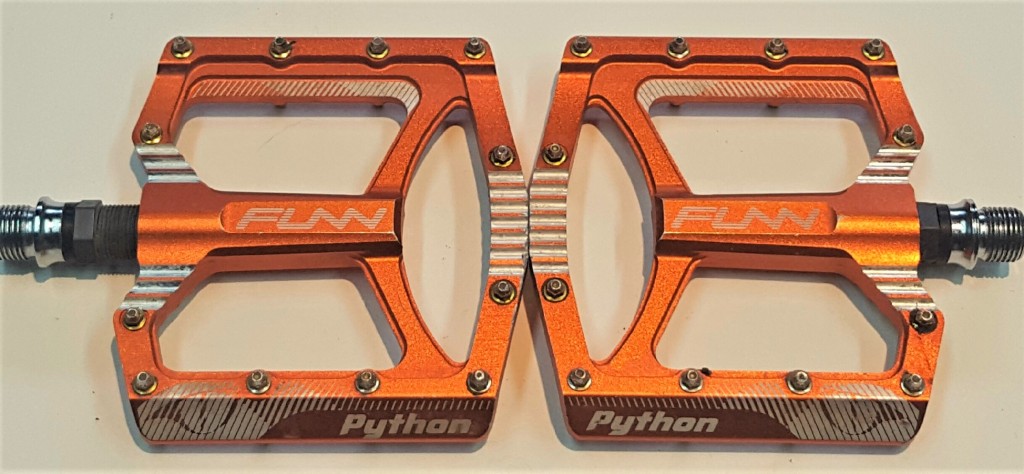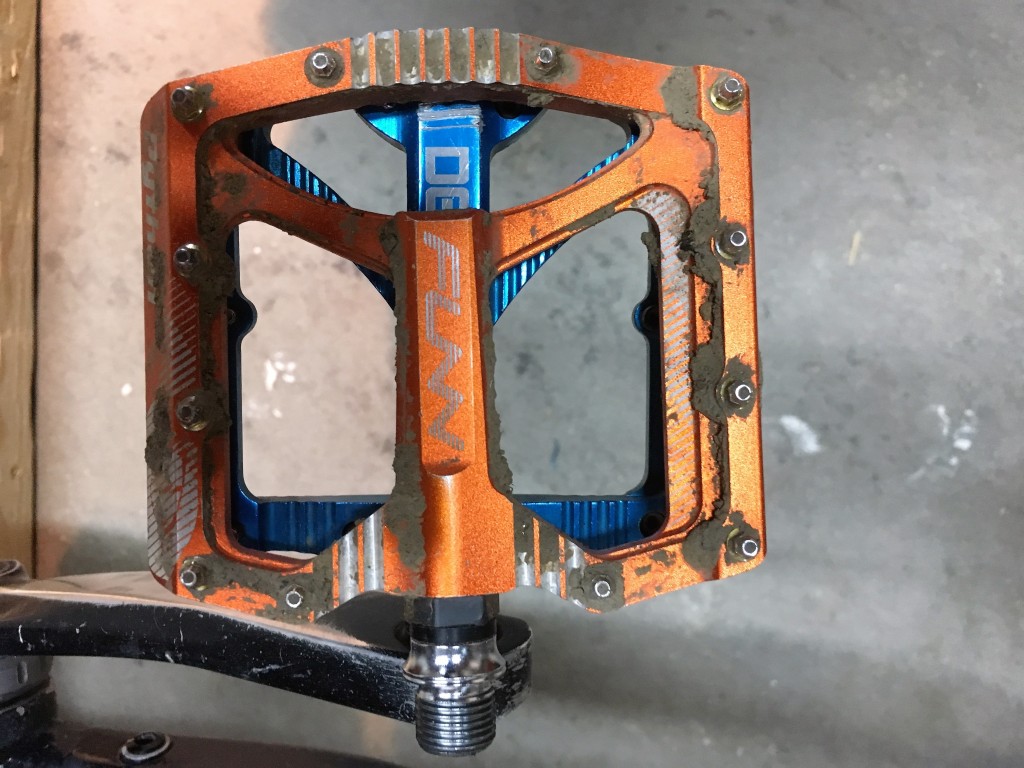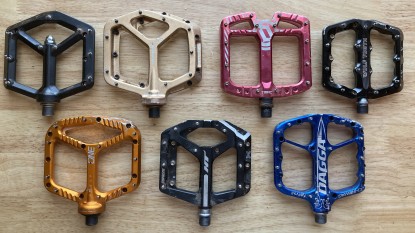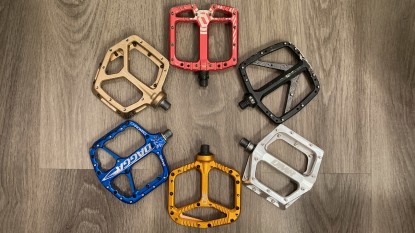Funn Python Review
Our Verdict
Our Analysis and Test Results
Performance Comparison
Grip/Traction
These pedals have 24 pins (12 per side) that came pre-installed from the factory. There is no fussing around with spacers. Interestingly, these pedals use a wrench to thread into place from the top rather than inserting from the bottom up through the pedal. Although all the pins survived our test period, we generally feel this makes pins difficult to remove in the event of a impact that ruins the head of the pins.
There are no pins located along or axle or in line with it at the outer edge of the pedal. The pedal has a thicker profile in the middle than it does towards the end, and the lack of pins here coupled with the slight rise in height underfoot gave this pedal a floaty feel. Float is a term typically reserved for clipless pedals whereby there is an amount of rotational movement where the cleat engages to the pedal. While some pedals have a firm attachment with little “wiggle room,” others allow more freedom of movement. Like most things, it's all personal preference, but these pedals often left us wanting more in this rating metric.
Platform
Our Sasquatch of a lead tester was happy with the moderately large 101 x 108 platform of this pedal. The platform is slightly convex, with the leading and trailing edges measuring at a rock avoiding 11 mm, and the axle area only slightly thicker at 14 mm.
The shape of the platform is pretty much square, but with enough bulge at the crank and distal ends to provide more surface area than the Deity Bladerunner. The pedal spends a reported 30 percent longer in the CNC machining process than the competition and the attention to detail is hard to overlook with silver undercuts and clean angles that catch even the most discerning eyes.
Mobility
Initially, these pedals had a fairly firm feel to them in terms of “spinability” around the axle. Within a couple rides, they loosened up and were the most mobile pedals in the test. For freestyle and dirt jumping applications, we'd prefer a little less mobility, but we're not complaining very hard. The large platform aided in locating the pedals before landing and the thin profile underfoot prevented unwanted pedal roll.
In place of bearings, the Python uses a self-lubricating plastic bushing. The bushing covers the entire length of the axle and reportedly spreads the load over the whole spindle rather than simply at the bearing locations as with other pedals. We questioned whether the plastic bushing was responsible for the loosened-up feel the pedals developed in a short time, but lab testing from Funn claimed these pedals withstood 1.5 million revolutions before failure.
Weight
This contender weighed less than its claimed weight of 375 grams. While the Python is a strong contender in this category, better all-around performance can be found in a lighter package, or with a nearly negligible weight penalty.
Service
Servicing the Funn was pretty straightforward. When you take the pedal apart, things are a lot neater than with some other pedals where the spindle is slathered in grease. The plastic, self-lubricating bushing keeps the internals nice and neat. We experienced a little seepage of grease that made its way out towards the O-ring on the crankarm end. We simply wiped it away, and it never reared its slimy head again. A service kit is available for $25.
Value
These pedals landed in a very competitive portion of the price continuum. They were a well-designed, high-quality pedal that we felt was worth the asking price. Extensive CNC machining and silver accents after the anodizing process meant this pedal was far from a bunch of slapped together metal.
Conclusion
The Python is a quality flat pedal with an excellent finish quality and a durable feel. While we enjoyed the relative ease with which we could adjust our foot position for freeride applications, we'd have liked a little more grip for enduro or downhill use. Rough terrain had our feet clamoring for traction. The thin and tapered profile and light weight made us think we had stumbled upon a new enduro slayer, but the reduced foot retention left us hoping for more.


